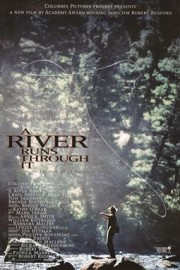A River Runs Through It
“A River Runs Through It” is a movie I ended up watching a lot when I was a kid, but I couldn’t tell you why I stopped watching it over the years. It might be that I had so much else I was watching I lost track of it. It might be that it just didn’t resonate with me growing up. I certainly thought it was a good movie, but for some reason, Robert Redford’s drama just didn’t connect with me over the years like something like “Stand By Me,” another film which uses the framing device of an old man reflecting on youth. Watching it on a whim this afternoon, at 43, I don’t know that I’ll find myself revisiting it time and again, but if I did, I wouldn’t be surprised.
This is a film I think about when it comes to my cousin Chad. One of my first cousins on my father’s side of the family, I spent a lot of time with that side of the family growing up, as we would go to my grandparent’s home in Brimfield, Ohio. We could occasionally go camping with my grandfather when we were kids, and we were close. We became closer still as we would visit from Georgia, and we would watch a lot of movies together. I don’t think we ever saw “A River Runs Through It” together in theatres, but maybe once at my grandfather’s house on VHS. He’s always been passionate about the outdoors, and fishing in general, and I think that’s what connected with him on this. It’s easy to see why, because nature has rarely looked as beautiful as it does in Philippe Rousselot’s Oscar-winning cinematography, with a lovely, Americana score by Mark Isham adding to the effect.
The film is based on a 1976 story by Norman Maclean about growing up in Missoula, Montana, with his Presbyterian minister father, his housewife mother, and brother Paul. The film is narrated by Redford himself, and his thoughtful, introspective voice carries us through as Norman recounts his childhood, some misadventures he has with Paul, and then- after leaving for college- returning after six years, and what would be the last summer he would spend with his entire family. The screenplay by Richard Friedenberg is structurally sound, with the emotion coming from Redford as a director, and the actors he enlists to tell this story. The moral compass of the film is Rev. Maclean, played by Tom Skerritt as a man who tries to instruct his sons with patience, but also a firm hand when they do something wrong. He also instructs them in fly fishing, which, to him, is as spiritual an experience as going to church, and for the rest of their lives, Norman (played as an adult by Craig Sheffer) and Paul (played by Brad Pitt) will always have a love of the peace and poetry of fly fishing.
“A River Runs Through It” has a fairly basic narrative structure, but one of the things Redford does that I forgot was how, when transitioning from Norman and Paul and kids to them as young men- and then, adults- he doesn’t do conventional flashbacks. The passage of time is shown through sepia-toned photographs, which makes sense given the time period (the late teens, early 1920s), but feels like a bold way of doing something in terms of cinematic storytelling. It works like a charm, however, and shows Redford’s commitment to the time period, and also the idea that this is about recollecting youth. I’ve been working through cleaning my parent’s house recently, and seeing old pictures have brought back memories of my time in Ohio; maybe that’s what inspired this rewatch.
Sheffer as the lead always feels like a strange choice. I’ve certainly seen him in a number of lead performances, and he’s a good actor, but he’s more of a strong character actor than a compelling lead. He embodies Norman, though, whose eyes we basically see the movie from, and he has strong chemistry with all of the actors, including Brenda Blethyn as the mother and Emily Lloyd as Jessie Burns, whom Norman begins to date. When Pitt is on screen, however, another energy just transforms the film, not only because Paul is the more rebellious brother, but you can tell even in this film that Pitt is going to be one of the most charismatic actors of his generation. Paul is the type of role that wins actors Oscars, and it’s pretty surprising he didn’t even get a nomination out of this role. Whether he’s convincing a speakeasy owner to let his Indian girlfriend in the bar or talking with his fellow newspaper men or fishing with Norman and their father in one of the best scenes in the movie, Pitt just takes the film to another level.
I haven’t fished since Boy Scouts, but what connects with me about this film is the idea of going home, reuniting with friends and family I haven’t seen in a while, and spending time reflecting on youth through memories. Now that many of those whom I’ve cared about over the years are gone- or nearer to the end of their lives than the front of them- and I see the ones that are still around less than I used to, those memories mean more to me now than ever before, even if it’s just something as simple as connecting a movie with one of those people in particular.










